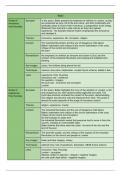Blake
Songs of Synopsis In this poem, Blake protests the treatment of children in London, as they
innocence: are presented as pure, full of life and colour, and both locationally and
Holy thursday spiritually closer to God in their innocence, a juxtaposition to the clergy,
distanced from God and in pale colours as they have gained
experience. The fairytale inspired rhythm emphasises this innocence,
and idealises it.
Themes innocence, experience, life, corruption, religion
Context The Industrial Revolution and the use of dangerous child labour
Blake’s admiration and critique of the church (admiration of the unity,
critique of the control and corruption)
the bard
Romanticism the emphasis on children as innocent and closer to God, and the
criticism of the Industrial Revolution and subsequent enlightenment
thinking
Key images colour, the children being above the old
Techniques caesura, slow pace, heptameter, couplet rhyme scheme, ballad in feel
Links experience: Holy Thursday
intimations ode - childhood
the question - imagery
the sick rose - innocence and corruption
London
Songs of Synopsis In this poem, Blake highlights the irony of the situation in London, a rich
experience: and prosperous city, with orphans being neglected and used. The
Holy thursday hymn-like structure contrasts the content of the poem, demonstrating
how religion has become cold and distanced from God. This poem is
almost the exact opposite of the songs of innocence version
Themes religion, experience, cruelty
Context The Industrial Revolution and the use of dangerous child labour
Blake’s admiration and critique of the church (admiration of the unity,
critique of the control and corruption)
the bard adopts an angry tone
the Industrial Revolution meant that everyone had to move in from the
country, resulting in overcrowded cities.
Blake claimed that there were two cities - the land of the rich and the
land of the poor
Romanticism The bard-like quality, and the critique of the impacts of the Industrial
Revolution on the church and people in London.
Key images bleak and bare imagery, misery
Techniques satirical irony, lots of paradoxes, tetrameter, ABAB rhyme scheme
Links innocence: Holy Thursday
London - corruption
Stanzas written in dejection - despair / negative imagery
the cold earth slept below - negative imagery
, the sick rose - corruption
songs of Synopsis this poem uses a dream-like quality to explore the impact of corrupting
experience: forces on the innocent, and how innocence is lost to experience.
the sick rose
Themes innocence, experience, sex/ virginity, love vs destruction
Context Blake’s quote ‘we once were whole but have been broken into
fragmented halves’
the picture to go with the poem was flowers
the garden of Eden
Romanticism children being innocent and the corrupting force of the world
Key images virginity and sex, deflowering
Techniques lots of symbolism and juxtaposition, ABAC rhyme scheme
Links experience: Holy Thursday - corruption
London - corruption
intimations ode - growing up
songs of Synopsis In ‘The Tyger’, Blake uses antiquated language and a strict child-like
experience: structure to mask the complicated content of the poem as part of a
the tyger nursery rhyme. The poem itself addresses industrialisation, contrasting
God’s pure creation with man-made destructive creation
Themes Religion, industrialisation, creation, the ruination of nature by man
Context The Industrial Revolution - factories and other poor working conditions
Blake’s stance on religion religious fables in general
the rise in science - Blake viewed this as the antithesis of nature and
god.
Satanic / religious imagery
Romanticism The critique of industrial London and the focus on creation
key images man-making nature, lots of industrial imagery, fire
Techniques apostrophe, archaic spelling, AABB rhyme scheme, phonoaesthetics
Links london - corruption of industrialisation
tintern abbey - nature vs man
lines written in early spring - the effects of industrialisation
songs of Synopsis Blake reflects on and criticises the state of humanity, trying to control
experience: nature and restricting our natural abilities. He mourns the loss of
London innocence, given way to miserable and oppressive experience.
Themes Experience, innocence, industrialisation, humanity trying to control
nature
Context industrialisation - limits the minds imaginative ability, factories become
the new thing to worship
vindication of the rights of man - every man is affected by thing, all men
should have rights, not just the bourgeois
the corruption of the church
Blake’s views on childhood innocence




